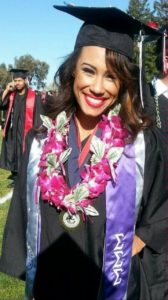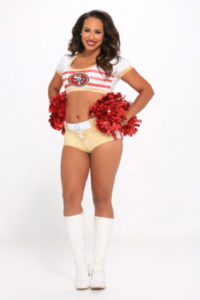Hi SciCheer fans, Samantha here! If you’re in the Bay Area on November 5, 2016, be sure to stop by the Bay Area Science Festival and meet our newest Science Cheerleaders! Two 49ers cheerleaders pursuing science and technology careers will join our partners at SciStarter to activate citizen science projects, sign autographs and tell visitors about their interesting careers! Learn more about the event, here.
Tell us about your degrees!
I am currently going to school to become a Clinical Sport Psychologist. A clinical sport psychologist helps athletes and teams improve their performance mentally. A cheerleading coach for example teaches cheerleaders jumps, cheers, and routines, whereas a S port Psychologist speaks with cheerleaders about their thoughts and feelings in relation to how they perform. Another part of my job is to educate and assist athletes in applying certain sport psychology tools that will overall enhance their performance. Some sport psychology tools that I often use are goal setting, imagery, and self-talk techniques. For example, if an athlete has low self-confidence and says negative things to themselves such as, “I can’t do this”, then I would teach them self-talk techniques which would ultimately teach them how to speak more positively to themselves.
port Psychologist speaks with cheerleaders about their thoughts and feelings in relation to how they perform. Another part of my job is to educate and assist athletes in applying certain sport psychology tools that will overall enhance their performance. Some sport psychology tools that I often use are goal setting, imagery, and self-talk techniques. For example, if an athlete has low self-confidence and says negative things to themselves such as, “I can’t do this”, then I would teach them self-talk techniques which would ultimately teach them how to speak more positively to themselves.
What does it mean for you to work as a Clinical Psychologist?
My motivation for pursuing a Doctorate in Clinical Psychology is to fulfill my innate ability to help others. I believe that everyone has a special purpose in life and I have concluded that my purpose is to clinically assist individuals with their mental health needs. I currently work with clients who have intellectual disabilities and issues with committing criminal offenses. I truly enjoy leaving my internship everyday knowing that my psychological interventions have made a positive impact on my clients’ lives. I also find it extremely rewarding to be able to develop a therapeutic alliance with clients and empathetically listen to their life experiences.
Why did you try out to be a professional cheerleader?
I auditioned to be a professional cheerleader for the 49ers because I wanted to fulfill my childhood dream. I also love the 49ers organization, family, foundation, community involvement and sisterhood.
How do you feel about breaking down negative stereotypes about cheerleaders?
My university prides itself on training its doctorate students in becoming multiculturally competent. Throughout my training, I have developed a new lens that allows me to be more aware of the overt and covert stereotypes that are present in today’s society. I therefore specifically take pride in challenging one’s stereotypical assumptions of cheerleaders. Whenever an individual makes an offensive stereotypical remark about cheerleaders, I always make sure to speak highly of the various hard working, intelligent and inspirational professional cheerleaders across the NFL.
Best cheerleading experience?
My most memorable cheerleading experience was performing at Super Bowl XLVII my rookie season. It was such a dream come true to be able to cheer on the 49ers in the Super Bowl and share the unforgettable experience with my 49ers family.
What’s one thing people might find especially surprising about you?
Most people would be surprised to know that I was a collegiate swimmer.

